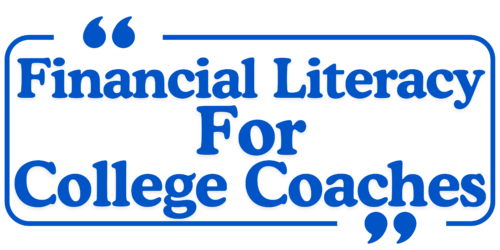Tax Strategies for College Coaches: Using Investment Vehicles to Reduce Tax Liability
As college coaches, many face unique financial situations, often earning substantial salaries but also incurring significant tax liabilities. Understanding how to strategically use various investment vehicles can help coaches minimize their tax burdens and maximize their net income. Here are several ways college coaches can leverage different types of investment vehicles to pay less in taxes.
1. Contribute to Retirement Accounts
One of the most effective strategies for reducing taxable income is to contribute to retirement accounts. For college coaches, options like a 403(b) or a Traditional IRA offer tax advantages:
403(b) Plans: Many educational institutions offer 403(b) retirement plans, which allow coaches to contribute pre-tax dollars. Contributions reduce taxable income for the year they are made, effectively lowering the overall tax burden.
Traditional IRA: Coaches can also contribute to a Traditional IRA, which allows for tax-deductible contributions depending on income levels and participation in employer-sponsored retirement plans. The money grows tax-deferred until withdrawn in retirement, when many coaches may be in a lower tax bracket.
2. Health Savings Accounts (HSAs)
If a coach has a high-deductible health insurance plan, they can open a Health Savings Account (HSA). Contributions to HSAs are tax-deductible, and the funds can be used for qualified medical expenses tax-free. Any unused funds roll over each year, allowing the account to grow tax-deferred. HSAs offer a triple tax advantage:
- Contributions are tax-deductible.
- Withdrawals for qualified medical expenses are tax-free.
- Interest or investment gains within the HSA grow tax-deferred.
3. Utilize Flexible Spending Accounts (FSAs)
Similar to HSAs, Flexible Spending Accounts (FSAs) allow coaches to set aside pre-tax dollars for qualified medical expenses. While FSAs typically require funds to be used within the plan year, they effectively reduce taxable income, which can lead to tax savings. Coaches can maximize their FSAs by accurately estimating their medical expenses for the year.
4. Invest in Tax-Advantaged Accounts
Roth IRA: While contributions to a Roth IRA are made with after-tax dollars, qualified withdrawals in retirement are tax-free. This can be particularly beneficial for younger coaches or those expecting to be in a higher tax bracket in retirement, allowing for tax-free growth of their investments.
529 Plans: Coaches with children may consider contributing to a 529 education savings plan. Contributions grow tax-free, and withdrawals used for qualified education expenses are also tax-free. Many states offer tax deductions or credits for contributions to 529 plans, further reducing taxable income.
5. Consider Real Estate Investments
Real estate can be a valuable investment vehicle for college coaches, providing potential tax benefits:
Depreciation Deductions: Real estate investors can deduct depreciation from their taxable income, which can offset rental income and reduce overall tax liability.
1031 Exchange: If a coach decides to sell a rental property, they may defer capital gains taxes by reinvesting the proceeds into another property through a 1031 exchange.
6. Take Advantage of Tax Loss Harvesting
Tax loss harvesting is a strategy that involves selling investments that have lost value to offset capital gains taxes on profitable investments. Coaches can strategically manage their investment portfolios to minimize their tax liabilities while maintaining a diversified investment strategy.
7. Explore Tax Credits and Deductions
Charitable Contributions: Donations to qualified charities can be deducted from taxable income. Coaches can consider donating appreciated assets, such as stocks, to avoid capital gains taxes while receiving a deduction for the fair market value of the donated asset.
Education Expenses: Coaches pursuing advanced degrees or continuing education may qualify for tax credits or deductions. The Lifetime Learning Credit or the American Opportunity Credit can reduce tax liabilities for eligible educational expenses.
8. Work with a Financial Advisor
Navigating the complexities of tax strategies can be challenging, especially for busy college coaches. Partnering with a financial advisor can provide tailored advice on investment vehicles and tax strategies to help coaches optimize their financial situation. An advisor can analyze a coach’s unique circumstances, identify tax-saving opportunities, and create a comprehensive financial plan that aligns with their goals.
Conclusion
For college coaches, understanding and utilizing various investment vehicles can significantly impact their tax liability. By taking advantage of retirement accounts, HSAs, FSAs, real estate investments, and tax credits, coaches can reduce their taxable income and enhance their overall financial well-being. With the right strategies in place and the guidance of a financial advisor, college coaches can navigate their unique financial landscape while keeping more of their hard-earned money.
Written by Pat Brown, MBA
